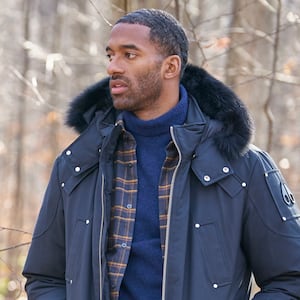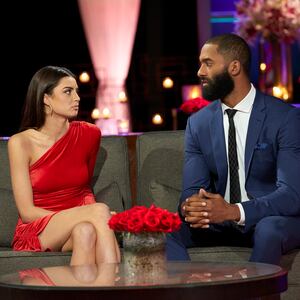As Matt James sat down with Emmanuel Acho during The Bachelor’s “After the Final Rose” finale special, the toll this season had taken on him became immediately clear.
James’ eyes alternated between vacant and teary as he described his break-up with Rachael Kirkconnell—who won this season but only after viewers surfaced her troubling past behavior, including attending an Old South-themed party. (Kirkconnell has apologized both on the air and on social media.) James sighed deeply and took numerous long pauses—especially when his conversation with Kirkconnell and Acho turned toward reconciliation. More than anything, it seemed the first Black Bachelor was still processing a lot of trauma.
In many ways, “After the Final Rose” is The Bachelor in peak form. The after-show often finds embattled contestants and recent exes at their weakest—and gently grills them for every ounce of emotion its host (usually Chris Harrison) can extract. Monday’s episode was no different, but it was nonetheless excruciating to watch.
Acho, filling in for Harrison after the longtime Bachelor host landed himself in hot water defending Kirkconnell, made admirable work of an undesirable job. His early questions highlighted why being the first Black Bachelor is such a responsibility, and the expectation heaped upon Black men and women to represent their entire race in every trivial social interaction. Later on, Acho proved adept at the show’s brand of friendly grilling—pressing James, Kirkconnell, and runner-up Michelle Young about all their most uncomfortable emotions. Ultimately, and perhaps most importantly, Acho proved that, yes, other people can perform Harrison’s job just fine, should his exit from the show become permanent.
Still, it was hard not to notice how invested the special seemed in protecting Kirkconnell—and how uninterested it seemed in protecting the Bachelor himself.
ABC first named Matt James this season’s Bachelor last summer, as Black Lives Matter protests across the country called for justice in the wake of George Floyd’s death. James told Acho that in becoming the first Black Bachelor against that national backdrop, he felt as though he had to “take on the weight of everything that was going on in the country at that timeframe regarding social justice—everything going within the franchise surrounding diversity and inclusion.”
“That’s the pressure that I felt, and that’s what I started to feel like my presence represented,” he said.
James’ selection as Bachelor was meant to indicate a step forward for a franchise that has historically (and repeatedly) fumbled on race. But as his season unfolded, viewers quickly noticed how little time we spent learning about James and many of his contestants; an outsized amount of time went, instead, to infighting largely between and instigated by white contestants. The show exploited James’ strained relationship with his father for drama without considering the effect that such a stereotypical portrayal of a Black man with an absentee father could have, absent any context about their specific history. And rather than address Kirkconnell’s disturbing social media history in real time, The Bachelor’s network and producers opted instead to do what they always do, when they can: Avoid commenting in the hopes of currying more interest (and better ratings) in the finale.
After the finale saw James ride off into the sunset (un-engaged) with Kirkconnell, the after-show focused on digging into the emotional aftermath of her racism scandal. James confirmed he and Rachael were no longer together, while Acho asked him what he’d say to those who thought his decision indicated he never loved Rachael. Acho and James both called against “canceling” Rachael, and Acho emphasized that although her past actions were racially ignorant and insensitive, that does not necessarily make her a racist. At one point, Acho asked James if he would consider reconciling with Kirkconnell—a question he’s begun to repeatedly answer by saying that she needs to do the work on her own. Throughout the conversation, Matt appeared more and more exhausted—and in the end, he declined to hug Kirkconnell goodbye.
Any fan who’s honest with themselves knows that The Bachelor has always been built on some degree of exploitation; reductively speaking, it’s evolved into a psychological experiment that doubles as an influencer incubator. But this franchise has proven repeatedly that it does not understand where the boundaries are when it comes to race.
As former Bachelorette Rachel Lindsay put it as she reacted to James’ season on the Ringer’s “Bachelor Party” podcast, “If the Bachelor franchise has shown us anything, it’s that they don’t know how to protect people of color. They only know how to exploit them.”
Lindsay rose to prominence within Bachelor Nation after appearing in Nick Viall’s Bachelor season in 2017 and, months later, becoming the first Black Bachelorette. Lindsay’s season, like James’, was meant to move the franchise forward—but just like James’, it did more to prove how much growing the franchise had left to do.
Lindsay, too, had a contestant whose unfortunate social media history surfaced before the season premiered. But Lee Garrett’s racist social media posts took a backseat to the on-air controversy that quickly developed between him and Black wrestler Kenny Layne. Garrett spent the season goading multiple contestants of color and particularly enjoyed picking at Layne.
Rather than illuminate to Lindsay what was going on, producers did what they normally do about contestant in-fighting—which is to say, nothing. In forcing Lindsay to navigate the conflict without all of the information about Garrett’s behavior, however, the show was putting its Black lead in a uniquely compromising position. Beyond the unfairness, it was dangerous.
The outrage surrounding James’ season has surpassed any of the ire that followed Lindsay’s. Chris Harrison apologized and chose to temporarily step away after he defended Rachael Kirkconnell on Lindsay’s Extra TV show—talking over Lindsay at times in the process. Lindsay herself has said that she’s leaving the franchise once her contract ends, and racist fans temporarily bullied her off Instagram. (Bachelor producers released a statement calling their behavior “unacceptable.”) And fans and alums alike are calling for change in a way not seen since the misconduct scandal that infected Bachelor in Paradise in 2017—when production halted for two weeks and then resumed after contestants Corinne Olympios and DeMario Jackson engaged in a drunken hook-up that raised questions of consent and producers’ responsibility to intervene.
It’s frustratingly easy to imagine that the conversations this season sparked could ultimately be temporary—that all of the uproar surrounding how this franchise has treated James and contestants of color could dissipate, allowing Harrison to return after Katie Thurston’s Bachelorette season without much incident in a return to business as usual. But it’s also possible, and more heartening, to imagine the future that awaits The Bachelor and its fans should this actually prove to be a source of lasting change.
Speaking with The Daily Beast about the show’s path forward, several Black alums emphasized several steps the franchise could take to make itself a safer, more inclusive place for Black contestants, and all contestants of color. They also suggested a fine-tuned screening process and hiring more crew members of color at all levels of production, which would make the productions as a whole better equipped to tell complex stories and avoid pitfalls like those we’ve already witnessed.
These changes are necessary and should become a top priority for the franchise. Alongside these vital diversity efforts, perhaps, should also come a broader discussion about what this franchise is and how it operates—how it builds its narrative out of people’s lives and frames them for public consumption, and how it determines what is “on” and “off” limits. How its audience follows white contestants at higher rates than contestants of color on social media. How sexist and racist bullying have become rampant within Bachelor Nation’s online circles.
In other words: Perhaps it’s time for all of us to reconsider where the show’s ethical boundaries, and our own as viewers, should fall.
Monday’s special is painful to witness because, in many moments, James’ pain felt like something so deep and personal that we did not have the right to witness it. It’s impossible to know without asking James how he felt about the questions he was being asked, or the special itself. But as the Bachelor teared up, stared into space, and, at one point, sat silently for almost a full minute, the degree to which the show had failed to protect him throughout this process grew palpable.
Even in the face of its most disturbing controversy yet, The Bachelor seems bent on moving forward without breaking stride. As announced Monday night, Katie Thurston’s Bachelorette season will premiere this summer, with former Bachelorettes Tayshia Adams and Kaitlyn Bristowe subbing in for Chris Harrison as hosts. Michelle Young, this season’s runner-up, will get her own season in the fall. It’s unclear if Chris Harrison will return for that, but all eyes will certainly be on Young as her season tries to tell the story of a biracial woman with a Black father and a white mother.
Matt James’ season was not the first in this franchise to go awry, and it won’t be the last. But if The Bachelor can’t find a way to do right by its leads of color by the time Michelle Young’s season airs, its days might rightly be numbered.



